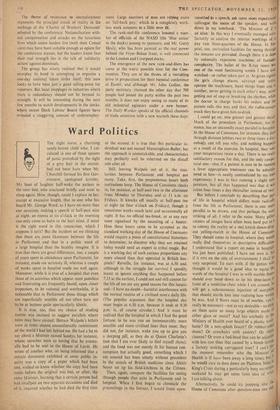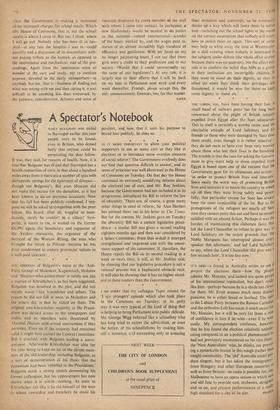Ward Politics
THE night nurse, a charming sandy-haired child who, I cal- culated in one of those spasms of panic provoked by the sight of a grey hair in the mirror, had not been born when Mr. Churchill formed his first Gov- ernment, apologised lavishly. My hoot of laughter half-woke the patient in the next bed, who eructated briefly and went to sleep again. How, though, could I explain to her, except at excessive length, that to one who has heard Mr. George Ward, as I have on more than one occasion, making a speech at half-past nine at night, an enema at six o'clock in the morning can only come as balm to the hurt mind, if mind is the right word in this connection, which I suppose it isn't? But the incident set me thinking that there are more likenesses between the life in Parliament and that in a public ward of a large hospital than the healthy imagine. It is true that there are great differences, too; a couple of years spent in attendance upon Parliament, for instance, made me seriously ill, whereas a couple of weeks spent in hospital made me well again. Moreover, while it is true of a hospital that even those of its activities which appear most pointless and frustrating are frequently found, upon closer inspection, to be rational and worthwhile, it is noticeable that in Parliament those things which are superficially 'sensible all too often turn out to be at bottom quite spectacularly idiotic.
It is true, too, that my choice of reading matter was inclined to suggest parallels where none may have existed; Horace Walpole's letters were at times almost uncomfortably reminiscent of the world I had left behind me. He had a lot to say about a Minister named Sandys, for instance, whose speeches were so boring that ho eventu- ally had to be sent to the House of Lords. He wrote of another who, on being informed that a certain document exhibited at some public in- quiry was a copy of a paper which had been lost, wished to know whether the copy had been made before the original was lost, or after; the same Minister, learning that a certain person had had smallpox on two separate occasions and died of it, inquired whether he had died the first time or the second. II is true that this particular in- dividual was not named Manningham-Buller, but the approach is unmistakable, and characteristics may perfectly well be inherited on the distaff side after all.
Still, leaving Walpole out of it, the simi- larities between Parliament and hospital are many. Take, first, the preposterous hours both institutions keep. The House of Commons clocks in, for instance, at half-past two in the afternoon from Monday to Thursday and at 11 a.m. on Fridays. It knocks off usually at half-past ten at night (at four o'clock on Fridays), though it sometimes works much later and occasionally all night. It has no official tea-break, or at any rate none signalised by the sounding of a hooter. How these hours came to be accepted as the standard working day of the House of Commons would require a posse of constitutional historians to determine; to discover why they are retained today would need an expert in tribal magic. But is a working day of such curious proportions any more absurd than that operated in British hos- pitals? Reveille, for instance, was at 6.30 and, although in the struggle for survival 1 speedily learnt to ignore anything that happened before 7.15 at the earliest, I could not and still cannot for the life of me see any good reason for this lunatic and—I have no doubt—harmful interference with the normal routine of a civilised man's daily life. (The popular argument that the hospital day must begin at 6.30 a.m. because it ends at 9.30 p.m. is, of course circular.) And it must be realised that the hospital in which I had the good fortune to be was run on immeasurably more sensible and more civilised lines than most; they did not, for instance, wake you up to give you a sleeping pill, as they do at Queen Charlotte's (not that I am ever likely to find myself there); and the food was not merely fit for human con- sumption but actually good, something which I am assured has been utterly without precedent in the annals of British medicine since Alexis Soyer set up his field-kitchens in the Crimea.
Then, again, compare the facilities for seeing through people that exist in Parliament and in hospital. When I first began to chronicle the proceedings in the former, I would listen open- mouthed to a speech, ask some more experienced colleague the name of the speaker, and write down in my notebook : 'The Minister of Z i5 an idiot.' In this way I eventually managed sans' factorily to analyse the interior workings of at any rate three-quarters of the House. In hos- pital, too, unrivalled facilities for seeing through the inmates are provided, though there it is done by colossally expensive machines of fantastic complexity. The ballet of the X-ray room was one of the most fascinating scenes I have ever watched--or rather taken part in. At given signals the girls change places, advance and retire. operate the machinery, hand things from one le another, never getting in each other's way, never getting out of step or breaking the rhythm, while the doctor in charge barks his orders and the patient rolls this way and that, the radio-opaque muck they have given him to drink.
1 could go on, into greater and greater detail. Much of the procedure in Parliament, for in' stance, has an uncannily exact parallel in hospital. In the House of Commons, for instance, they pass through division lobbies two or three times a day: nobody can tell you why, and nothing happens as a result of the exercise. In hospital, they take your temperature twice a day. There is no really' satisfactory reason for this, and the only conjec' tural one—that if a patient is seen to be running a fever appropriate treatment can be adminis' tered to him—is neatly contradicted by my own experience; I was in fact running a slight tern' perature, but all that happened was that it Was taken four times a day thereafter instead of twol But before I conclude by describing that Part of life in hospital which differs most radically from the life in Parliament, there is one more parallel to be drawn, and that perhaps the most striking of all. I refer to the noise. Many gifted coiners of images have often been hard put 10 it to convey the reality of a real knock-down-drag' out yelling-match in the House of Commons' They should come to hospital, where they would really find themselves in descriptive difficulties. I understand that a report on, noise in hospitals has just been published; I have not seen it, bat if it errs on the side of overstatement I shall he very surprised. To start with, if the genius NO° thought it would be a good idea to equip the wards of the hospital I was in with marble floors should ever bend down to tie his shoe-laces in front of a medicine-chest while I am around, he will get a subcutaneous injection of morphine that should startle him into realising how wrong he was. And if floors must be of marble, can it reaLly be necessary—not to say desirable—to Op. on them quite so, many large objects made nt either glass or metal? And has anybody in the Ministry of Health ever heard of a plastic wtoh, basin? Or a non-splash faucet? Or rubber-sole" shoes? Or armchairs with castors? Or silent cisterns? Or even a bed-head that can be adjusted with less row than that caused by a bomb hitting a factory making corrugated iron? I can't f°,. the moment remember who the Minister Health is (I have been away a long time), but it. he would care to doss down on Platform Nine at King's Cross during a particularly busy excursion t
weekend he may get some faint idea of I am talking about.
Alternatively, he could try popping into the House of Commons after question-time one daY ‘vhen the Government is making a statement abut increased charges.for school meals. Which (the House of Commons, that is, not the school meals) is where I came in. BM not, I think, where I will go out. Nobody who has been ill in hos- pital—at any rate the hospital I was in—could possibly end a discussion of its discomforts with- out paying tribute to the human,•as opposed to the institutional and mechanical, side of the pro- ceedings. Apart from the continuous sense of wonder at the care and study, not to mention expense, devoted to the fairly unimportant—to anybody but me, that is—business of finding out what was wrong with me and then curing it, it was difficult to be anything less than awestruck by the patience, consideration, deftness and sense of vocation displayed by every member of the staff with whom 1 came into contact. In particular, a new Shaftesbury would be needed to do justice to the national—indeed international—scandal of the hours worked by, and the wages paid to, nurses of an almost incredibly high standard of efficiency and gentleness. With my hand on my no longer palpitating heart, I can say that these girls were a credit to their profession and to our society. (Would that I could unreservedly say the same of our legislators!) At any rate, it is largely due to their efforts that I will be back on my beat in Parliament next week and every week thereafter. Friends, please accept this, the only announcement. Enemies, too, for that matter.
TAPER















































































 Previous page
Previous page